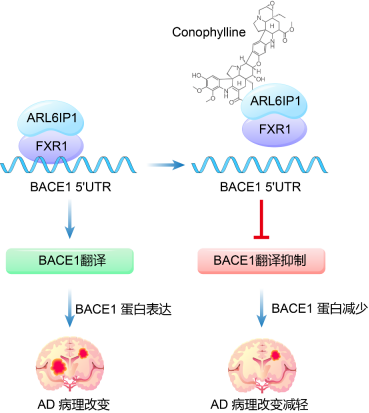The latest research results from Professor Chen Guojun’s team at the Key Laboratory of Major Neurological and Mental Diseases of the First Affiliated Hospital of CQMU was published online in PNAS, a prestigious international academic journal, titled “ARL6IP1 mediates small-molecule-induced alleviation of Alzheimer pathology through FXR1-dependent BACE1 translation initiation”.

Alzheimer’s disease (AD) is the most common type of dementia in the elderly, with a complex pathogenesis and limited treatment options. The strategy of this paper is based on the pathology of AD, using BACE1 as a “readout” to closely link Aβ generation with upstream regulatory mechanisms in AD. Partial inhibition of BACE1 maintains the physiological function of the remaining enzyme, avoiding the off-target effects of BACE1 inhibitors.

Using cell-based high-throughput screening, Professor Chen’s team discovered a natural small molecule substance called conophylline (CNP) which inhibits the protein level of BACE1. CNP penetrates across the blood-brain barrier and exerts its biological effects through binding to the established ligand ARL6IP1 (ADP-ribosylation factor-like protein 6 interacting protein 1). ARL6IP1 binds to FXR1 (fragile X mental retardation protein 1 homolog 1), suppressing FXR1’s activity in the regulation of the 5'UTR of BACE1 mRNA, which results in the inhibition of BACE1 translation and ultimately mitigates the pathological changes in AD. This study reveals a novel mechanism of dynamic binding between RNA-binding protein FXR1 and mRNA regarding the regulation of translation in AD, with potential therapeutic value for AD. The research findings related to CNP have been granted a national patent for invention.